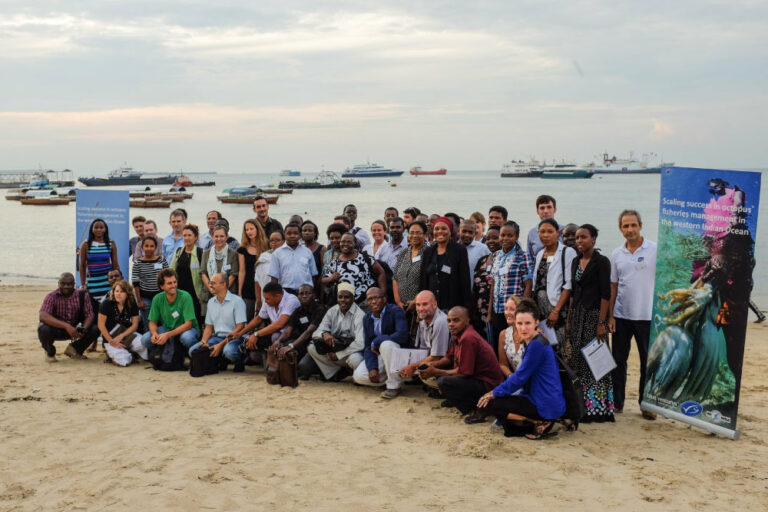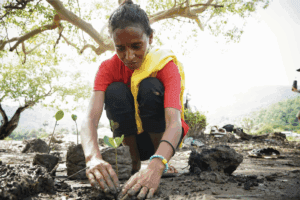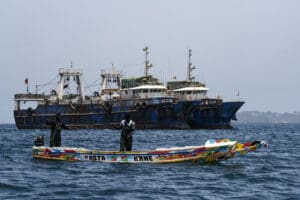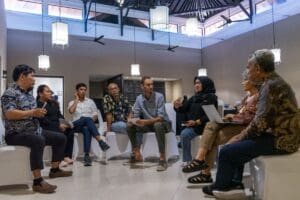6 December 2014, Stone Town, Zanzibar – Improving the management of Africa’s small-scale fisheries can deliver sustained benefits throughout the seafood supply chain, benefiting coastal communities while rebuilding dwindling fish stocks. This was the message of a landmark meeting in Zanzibar, bringing together 65 delegates from 13 countries across east Africa and the western Indian Ocean.

The past decade has seen a proliferation of management efforts targeting small-scale fisheries in the western Indian Ocean (WIO). Many measures have focused on building local capacity for management of the reef octopus (Octopus cyanea) and several fisheries have undergone pre-assessment against the Marine Stewardship Council’s (MSC) environmental standard. However, recent years have seen a growing interest in fisheries improvement projects (FIPs) for invertebrate fisheries across the WIO, including some octopus fisheries moving towards MSC certification.
In Zanzibar’s historic capital Stone Town, this week a workshop hosted by the MSC and Blue Ventures, with support from the Western Indian Ocean Marine Science Association (WIOMSA), attracted 65 delegates from across the region representing governments, NGOs, fishing communities, regional organisations and the seafood industry.
Tinah Martin, a fisheries scientist with Blue Ventures in Madagascar commented, “We’ve worked closely with individual fisheries for some years and have achieved notable successes in local management. To be able to share these lessons with so many influential people in this setting is a great opportunity to build on what we’ve learned and to look at scaling up these efforts across the region.”
The three day programme included an overview of the status and importance of octopus fisheries for the food security and livelihoods of WIO communities. Reflecting on practical experiences from as far afield as Seychelles and Senegal, participants considered the role of fisheries improvement projects (FIPs) in addressing the data and management capacity challenges that often hinder progress towards sustainable management in small-scale and developing world fisheries.
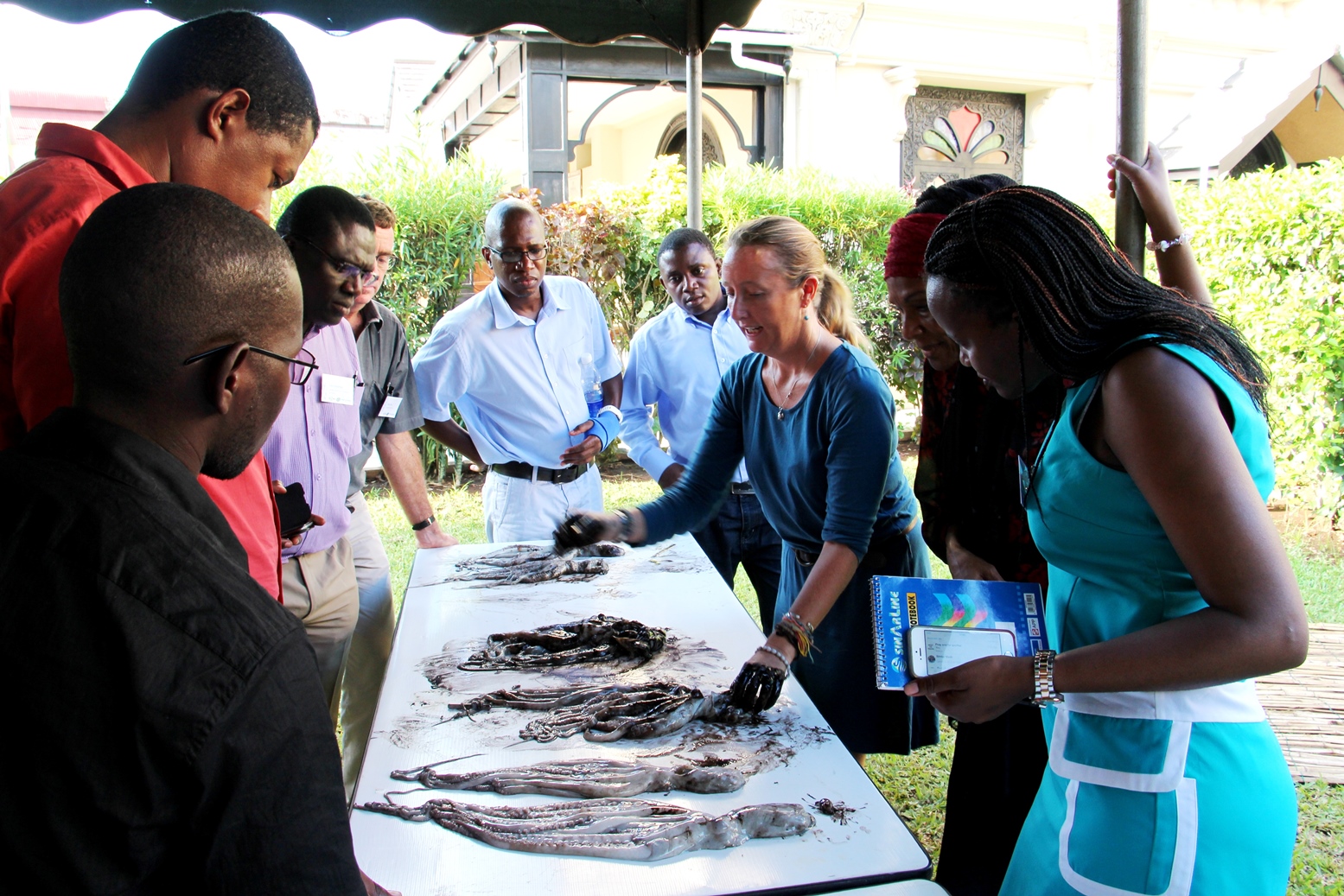
Collaborative efforts between NGOs, governments, funding bodies and supply chain stakeholders have been very effective in delivering targeted outcomes in some FIPs. Crucially, successful projects all shared strong leadership and an increasing number of FIPs use MSC pre-assessment to guide the development of action plans.
WIOMSA’s Director of Outreach and Resource Mobilisation, Tim Andrew, adds, “there are many commonalities between octopus fisheries in the western Indian Ocean and what works for one can quite conceivably work for others. By sharing experiences we will improve our understanding of what makes a successful project and can work together to provide the practical support and guidance that is necessary to improve the sustainability of octopus for all the countries involved.”
Martin Purves, the MSC’s southern Africa Programme Manager, commented, “MSC certification and its associated market benefits should be accessible to any fishery that is able to demonstrate sustainable management. The MSC has developed a range of accessibility tools that can support FIP practitioners in moving fisheries towards more sustainable practices. By doing so we hope that more fisheries will be encouraged to ultimately seek MSC certification.”
—- ENDS —-
About the partners:
Blue Ventures is a science-led social enterprise that works with coastal communities to develop transformative approaches for nurturing and sustaining locally led marine conservation. We work in places where the ocean is vital to local people, cultures and economies, and where there is a fundamental need to support human development.
Over the last decade our models have guided national fisheries policy and been replicated by communities, NGOs, businesses, donors and government agencies along thousands of kilometres of coastline. Recent experiences of scaling success in small-scale fisheries management in the western Indian Ocean are documented in this short film.
We have created the largest locally managed marine protected areas in the Indian Ocean, catalysed a sea change in community-led fisheries management, established sustainable aquaculture and ecotourism businesses, and developed new approaches to financing and incentivising marine conservation. So far our work has impacted the lives of more than 200,000 coastal people.
Western Indian Ocean Marine Science Association (WIOMSA) is a regional professional, non-governmental, non-profit, membership organisation registered in Zanzibar, Tanzania. The organisation is dedicated to promoting the educational, scientific and technological development of all aspects of marine sciences throughout the region of Western Indian Ocean (Somalia, Kenya, Tanzania, Mozambique, South Africa, Comoros, Madagascar, Seychelles, Mauritius, Reunion), with a view toward sustaining the use and conservation of its marine resources.
WIOMSA promotes marine science research through the award of research grants under the Marine Science for Management (MASMA) and the Marine Research Grant (MARG) programmes. It provides a wide range of services to a broad spectrum of national, regional and international organisations includes project and programme planning and delivery, organisation of events and training courses, technical and professional capacity development, administration of grants funds, review of technical documents, and a broad range of consultancy on behalf of different clients.
For more information, please visit www.wiomsa.org.
The Marine Stewardship Council (MSC) is an international non-profit organisation set up to help transform the seafood market to a sustainable basis. The MSC runs the only certification and ecolabelling program for wild-capture fisheries consistent with the ISEAL Code of Good Practice for Setting Social and Environmental Standards, and the FAO Guidelines for the Ecolabelling of Fish and Fishery Products from Marine Capture Fisheries.
These guidelines are based upon the FAO Code of Conduct for Responsible Fishing and require that credible fishery certification and ecolabelling schemes include:
- Objective, third-party fishery assessment utilising scientific evidence;
- Transparent processes with built-in stakeholder consultation and objection procedures;
- Standards based on the sustainability of target species, ecosystems and management practices.
In total, more than 345 fisheries are engaged in the MSC programme, with 243 certified and 102 under full assessment. Together, fisheries already certified or in full assessment record annual catches of close to ten million metric tonnes of seafood. This represents over 11% of the annual global harvest of wild capture fisheries. Certified fisheries currently land over 7 million metric tonnes of seafood annually – close to 8% of the total harvest from wild capture fisheries. Worldwide, more than 25,000 seafood products, which can be traced back to the certified sustainable fisheries, bear the blue MSC ecolabel.
For more information, please visit www.msc.org.

